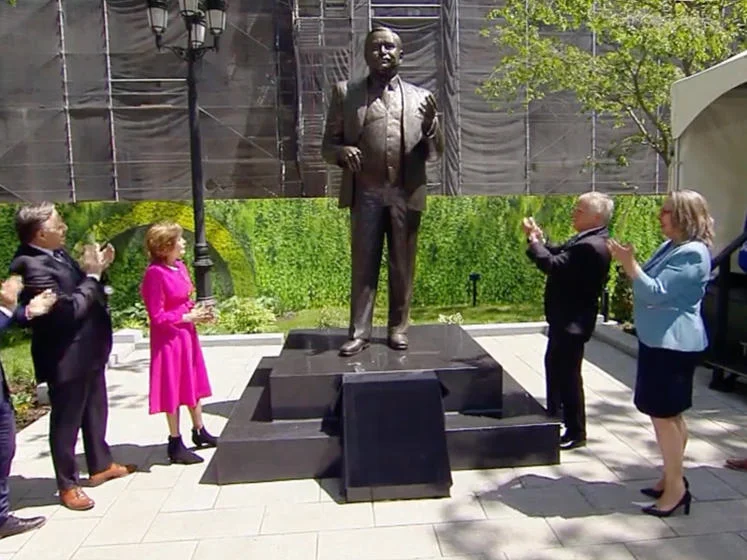Leading of the independence movement

Kevin Dougherty (MSc Politics of the World Economy 1986) writes about fellow alumnus Jacques Parizeau (PhD Economics 1955) – the Québec Premier who came close to winning a 1995 referendum intended to set in motion the process of making Québec a separate country from Canada.
Born in Montréal in 1930, Jacques Parizeau learned English from an early age, with a combination of English-speaking nannies and summer activities, although he also went to Stanislas, a private, secular French lycée in Montréal.
Parizeau began his studies at HEC Montréal in 1947 and, at 17, he was considerably younger in a cohort of mostly returning war veterans. As a student, he was drawn to François-Albert Angers, an economics professor who was a Québec nationalist. Angers saw promise in him, and arranged for HEC Montreal to pay his post-graduate studies in Europe.
Studying in Europe
Parizeau enrolled in both Sciences-Po and the Faculty of Law in Paris in 1951, and Angers prevailed on the French education minister to allow him to do a doctorate, to fulfill Angers’ dream of having a first Paris-trained PhD teaching at HEC Montréal.
In Paris, Parizeau discovered a new mentor, François Perrroux, an economist who favoured state intervention in the economy. But Parizeau soon realised his interests were more quantitative, and LSE would offer him econometrics and advanced Maths.
With master’s degrees in hand from Paris, Parizeau informed Angers of his intention to complete his PhD in London. Angers was disappointed and tried to talk him into staying in Paris, but Parizeau would not relent, so Angers gave him two years to complete his doctorate at LSE.
He travelled to London in 1953 to become one of two Canadians, with Richard Lipsey, under thesis director James Meade – who went on to win the Nobel Prize for Economics in 1977. Parizeau would say afterwards, "Meade taught me to work. Perroux gave me intellectual curiosity."
After graduating in 1955, Meade encouraged him to stay at LSE, but he said he had a "debt of honour" to Angers and decided to return to Canada.
Return to Montreal
Parizeau returned to Montréal to teach at HEC. He became a government consultant in the 1960s period known as Québec’s "Quiet Revolution," when major social and economic changes were made to modernise and secularise a society where the French-speaking majority was in the lowest rungs in terms of education and income, a society until then dominated by the Roman Catholic church.
He was part of a team of young academics, senior civil servants, and emerging business leaders behind the Liberal government of Jean Lesage when it nationalized Québec’s hydroelectrical generating sources, created a state investment agency and a pension plan, whose funds were invested by the new Caisse de dépôt et placement du Québec. The Caisse headquarters building in Montréal has been named after Parizeau. Today, its diversified global portfolio of C$420 billion (US$335 billion), includes minority stakes in Eurostar and Heathrow.
Parizeau was a believer in Canadian federalism, but debated with himself whether it would be best for Québec to have a strong central government in Ottawa, or a separate Québec state. In 1967 he boarded a train in Montréal planning to write the speech he would deliver in Banff, in the Canadian Rockies, four days later. "When I got on the train, I was a federalist," he said, "and when I got off, I was a separatist."
In the late 1970s, Parizeau was appointed Finance Minister in the Parti Québécois government. As Minister of Finance in Québec, he was responsible for a number of innovative economic proposals, including the Québec Stock Savings Plan. Inspired by Schrumpeter’s "small is beautiful" approach, he also favoured the development of small and medium businesses.
Parizeau resigned from cabinet and his seat in 1984 due to differences with Lévesque, who had moved away from pursuing independence goal to propose the "beau risque", taking a chance on working with the federal government of Canada.
The Parti Québécois lost the 1985 election and Parizeau, still a widely liked figure, returned as the party leader in 1988. Five years later, the Parti Québécois won a majority government in the 1994 election, and Parizeau promised to hold a referendum on Québec sovereignty within a year.
In June, the unveiling of a bronze statue of Parizeau on the seventh anniversary of his death brought together all parties in the Québec National Assembly, friends, relatives, associates and three Québec premiers.
Current Québec Premier François Legault noted that Québec, the only Canadian province with a French-speaking majority has had a few great statesmen, adding that Jacques Parizeau was among the most important, the greatest.
June 2022